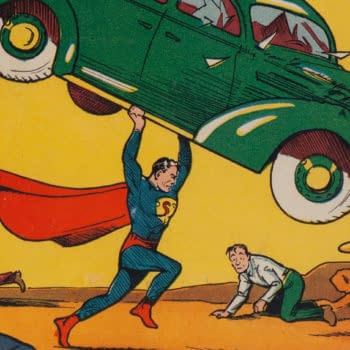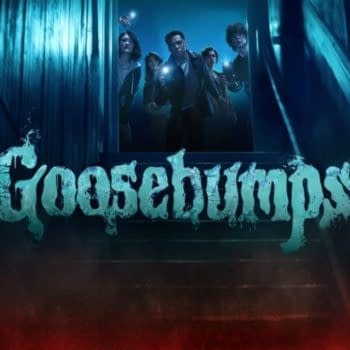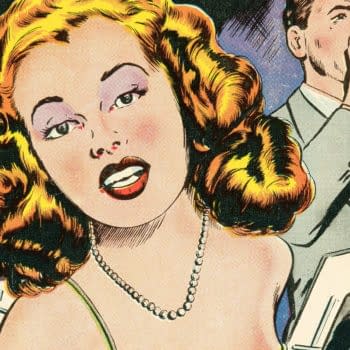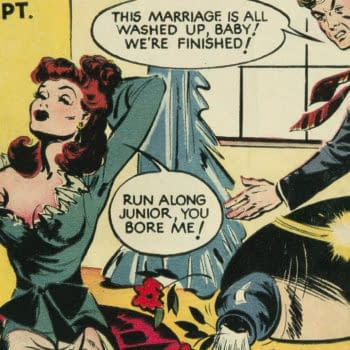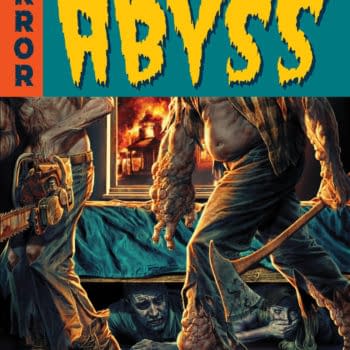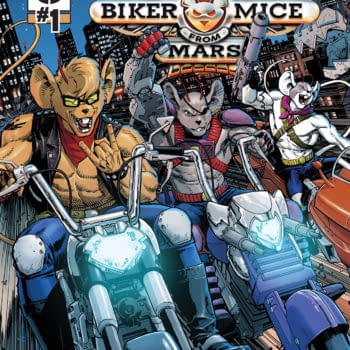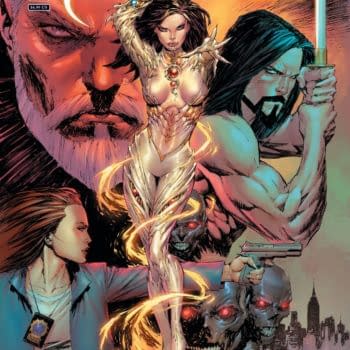Posted in: Comics, Recent Updates | Tagged: Comics, dc comics, jerry siegel, joe shuster, marc toberoff, superman
Superman, DC Comics v. Pacific Pictures Corp, And The Toberoff Timeline

We like to see behind the curtain in the comics industry, get to know the faces, and figure out how and why they do what they do. But of course, it's often difficult to do that when the various parties involved come into conflict. Perhaps you'll see a frustratingly polished notice in Variety or the Hollywood Reporter. Sometimes you'll stumble across public legal documents dug up and posted by a blogger, which often seem impenetrable in their own way.
The October 25 decision by Judge Otis D. Wright to deny Marc Toberoff's motion to strike several claims in DC Comics v. Pacific Pictures Corp. first came to my attention from a post by Mark Zaid, a Washington, DC attorney specializing in cases involving national security, who also has an interest in comics and the intersection between comics and the law — last year he curated an exhibit "Superheroes in Court! Lawyers, Law and Comic Books", at the Yale Law School library. So I asked Zaid for his thoughts on this most recent development, and he told me, "This current incantation of the Superman litigation offers a fascinating glimpse into an area that would otherwise have been normally closed off to the public; the attorney-client relationship between Marc Toberoff and the heirs of Superman co-creators Jerry Siegel and Joe Shuster. The thrust of the existing case, which due to the Court's recent decision remains alive and well, is that Toberoff acted beyond and outside the scope of an attorney-client relationship and, instead, tortiously interfered with long-standing and settled agreements between D.C. and the heirs. In essence, D.C. (through its parent company Warner Bros), is attempting to demonstrate that Toberoff's actions were motivated by personal greed and led to the contentious, and draining, litigation that has existed for the last decade. While the merits of this dispute have yet to be adjudicated this litigation will likely take the parties into depths even Superman would prefer to avoid."
With this case, we're getting a glimpse behind curtains that don't usually get parted. In May 2010, DC Comics took the unusual step of suing Marc Toberoff, the attorney representing the Siegel and Shuster families, alleging in part:
Toberoff induced the Shuster heirs to repudiate their 1992 agreement with DC Comics and enter into a 50/50 joint venture with defendant Pacific Pictures Corporation, a company wholly owned and controlled by Toberoff, pursuant to which the heirs conveyed the entirety of their purported Superman copyright termination rights to the venture. The stated purpose of the venture was to secure and exploit DC Comics' copyright interest in Superman. Toberoff procured this joint-venture agreement even though he knew that the Shusters' 1992 agreement with DC Comics operated to grant any and all of the heirs' interest in Superman to DC Comics and extinguish any termination rights the heirs might have held. Toberoff also induced the Shuster heirs to serve a notice of termination purporting to terminate and recapture alleged interests they had granted to DC Comics under the parties' 1992 agreement. This termination notice was invalid: among other defects, it was filed by a party lacking the necessary majority interest to terminate. Furthermore, any putative right to terminate held by Joe Shuster ceased to exist when he died having elected not to exercise it during his lifetime and having died without leaving a surviving spouse, child, or grandchild to inherit and exercise it.
As a result of his arrangements with both the Shuster and Siegel heirs, Toberoff secured control of the largest financial stake in the collective, putative Superman termination rights (i.e., Toberoff—47.5%; Siegel heirs—27.5%; Shuster heirs—25%). Toberoff sought further control, however. In order to assert that DC Comics had no further rights to exploit the derivative Superman character "Superboy"—including in the highly popular Smallville network television series—Toberoff manufactured the position that Jerry Siegel alone—to the exclusion of Shuster—was the sole creator of Superboy. Toberoff did so with full knowledge that his 2001 agreement with the Shusters explicitly confirmed the Shusters' asserted joint rights in Superboy, consistent with the long-held view of Shuster, Siegel, and their heirs that Superboy was jointly created by Shuster and Siegel.
A large part of the basis for this lawsuit is an anonymous letter titled "Superman – Marc Toberoff Timeline" given to Warner Bros along with a cache of documents taken from Toberoff's office. Toberoff issued a press release after the suit was filed, stating:
Warner and Mr. Petrocelli are aware that the frivolous allegations in their complaint do not add up and will never pass muster in the federal courts. However, that's not the point of their lawsuit. Warner and Petrocelli's objective is to "muddy the waters" by attacking Mr. Toberoff, potentially conflict him out of the case, and thereby strong-arm the Siegels and Shusters into selling at a cut-rate price the copyrights they have legitimately recaptured. Such unethical tactics are nothing short of deplorable.
Last but not least, Warner oddly attached to their complaint an anonymous, inadmissible letter spewing unsubstantiated and unattributed accusations against Mr. Toberoff, and pressed media contacts to publish the defamatory letter. The anonymous letter is a hyperbolic rant that never "connects the dots" in any legally cognizable fashion.
The anonymous letter was supposedly included with a large pile of privileged documents that were brazenly stolen from Mr. Toberoff's law offices and mysteriously arrived at Warner Bros.' doorstep in the midst of this billion-dollar litigation. Even though triplicates of this illegal package were allegedly delivered to top lever Warner executives, including President and COO Alan Horn and former General Counsel John Schulman, Warner claims to have no records whatsoever of such deliveries, nor of the packaging they arrived in. This hardly rings true for a studio that tracks every script or treatment through its doors. Time will tell what role Warner played with regard to the stolen documents and the anonymous letter.
However, in May 2011, a Judge ruled that Warner Bros could have access to these documents, because, as the Hollywood Reporter stated in their piece on the matter, "Toberoff had already disclosed the nature of those documents to law enforcement authorities who were investigating the theft. In other words, Toberoff became victimized by the burglary of those documents. Judge Zarefsky found that Toberoff "could have responded to the subpoena by standing on [attorney-client] privilege," but didn't."
Public response to the continued developments spinning out of these documents ranged from outrage at DC Comics from widely-read entertainment blogger Nikki Finke, to comics law blogger Daniel Best's note on the "series of Machiavellian moves" on the part of Toberoff himself that the timeline letter implies.
What's in this so-called "Superman – Marc Toberoff Timeline"? It is attached as Exhibit A in the original DC Comics v. Pacific Pictures Corp. filing, and it's a fascinating read, to say the least:
Exhibit A to DC Comics v Pacific Pictures Corp — Superman Marc Toberoff Timeline
Is this letter, now part of the public record of the case, simply an "anonymous, inadmissible letter spewing unsubstantiated and unattributed accusations against Mr. Toberoff" and a "hyperbolic rant that never "connects the dots" in any legally cognizable fashion", as Toberoff says? As the curtains continue to part in this case, we may find out. In his October 25 decision, Judge Wright notes:
As the Toberoff Timeline is currently the subject of a discovery dispute, and Plaintiffs sought but Defendants opposed staying this motion pending resolution of discovery, the Court is inclined to construe the uncertainty against the moving parties, Defendants. In any event, Plaintiffs have established a long-lasting economic relationship with the Siegels, and allege that Toberoff's nonprotected conduct interfered with this relationship. (Compl. ¶¶ 180-86.) Under the facts before the Court, Defendants have simply not met their burden of demonstrating that this claim arises from protected activity.
The Court finds particularly illustrative Judge Larson's prior observations of the negotiations between DC Comics and the Siegels, around the time of the alleged interference, and without knowledge of the present claim:
"From the Court's reading of the parties' [October 19, 2001 and October 26,2001] correspondence, it is clear that the parties went well beyond reaching a settlement in principle regarding their respective positions to the Superman property. Rather, . . . the parties' correspondence, and the actions taken inresponse thereto, illustrates that they found themselves in the all-too-familiar situation in which verbal settlement negotiations result in what the parties believe to be an agreement on all the major points of dispute, but which, upon further discussion, falls short of the agreement needed to resolve their dispute. The devil, as it often is, was in the details."
Siegel v. Warner Bros. Entertainment Inc., 542 F.Supp.2d 1098, 1137 (C.D. Cal. 2008). The devil, Plaintiffs argue, was Toberoff's interference and, suffice it to say, Defendants have not established-through the haze of details-that Toberoff's alleged misconduct is protected.
As this case winds on, it will be fascinating to see what alleged devils the court may uncover as it examines these details.
Below is the complete text of the October 25 decision in the case, with thanks to Mark Zaid for obtaining it.
10.25 Order Denying SLAPP Motion — DC Comics v Pacific Pictures




